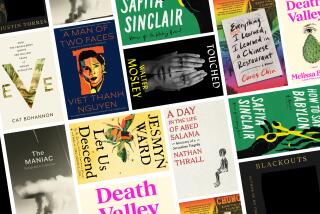Tales of Privilege and Vast Moral Decay
- Share via
Weightlessness.
That’s the image that Robert Bingham’s debut collection of 12 short stories leaves with us. Not that the stories themselves are light or trivial. But Bingham’s characters float in a moral vacuum so profound that it seems otherworldly. We think of astronauts in orbit, the spurious freedom that the absence of gravity affords them--distending their internal organs, weakening their bones, melting their muscles to flab. The slightest impulse, for good or evil, is enough to nudge them off dead center, send them drifting into one or another wall of their spaceship--a collision that can be startlingly painful.
What ails them isn’t quite the “unbearable lightness of being” of which Milan Kundera wrote, but it’s a related complaint. No duty or necessity weighs down on them, these young New Yorkers with their trust funds or lucrative jobs in law firms and brokerage houses, their attractive if unsatisfactory spouses and lovers. No cultural or religious heritage haunts them, as the memory of a Midwest “at moral attention” chided F. Scott Fitzgerald’s playboys and New England rectitude whispered to John Cheever’s Manhattan transplants. For Bingham’s people, only the pain is real. So they half-consciously seek it out--in drugs, violence and lowlife affairs.
They know what they are. A journalist visiting Hanoi thinks of himself as “a weak American man, a slave to his appetites, unable to disguise a thing.” He is both amused and saddened to find that he carries--in the form of music tapes that his Vietnamese escorts want to pirate--the germs of a corruption for which his hosts have no immunity. A Hollywood screenwriter honeymooning in Vermont imagines the locals viewing him as “rich filth . . . an expensive example of moral decay.” As if to prove it, he and his bride plan the murder of a fellow skier who has insulted them.
“Am I really that contagious?” a woman in a cocktail lounge asks the lover who has come to save her. She has run away from the rehab center where both are patients. In a previous story, the man beat his girlfriend, crashing into “the last wall of self-restraint” and breaking through it. With this new woman, he seeks redemption. What he finds instead is cocaine and craziness--”a night of slavery people mistook for a good time.” Yet after bouncing off this wall of the spaceship, he drifts back in the direction of sobriety. “Perhaps,” he thinks tentatively, “I am cured.”
What went wrong with these people in the first place? The only diagnosis Bingham gives us is a parody. One of his characters, a trendy journalist who isn’t above paying junkies to shoot up while he photographs them for a magazine article, natters about “negative social synergies forged out of the meaninglessness of a headlong consumer society.” He describes “a new lost generation,” young adults who “in another time . . . would have become leaders . . . but for various reasons had opted out of a society they could no longer ‘negotiate.’ That was the word he used,” Bingham says, “and the writer made it clear that he had been there, had ventured to the edge of that world only to come back to report on it.”
Well. Bingham, too, writes with the authority of one who has made that scene, or observed it at very close range. He also writes with elegance and economy and a wicked sense of humor. The question, for at least half of this collection, is whether we care. As fictional subjects go, anomie is a no-brainer. Somebody with less ability than Bingham, like Bret Easton Ellis, can render it effectively enough. We worry that a writer who sticks to the easy stuff will, in time, find a lack of literary gravity softening him.
Fortunately, the title story shows Bingham capable of more. The narrator looks back on himself as an 11-year-old in 1973. His family lives next door to a larger, richer one. We see the origins of the disease more clearly--in a carelessness bred of too much money and too few values, a fascination with fireworks, pillow fights, the killing of songbirds with BB guns for “pure slaughter value.” Yet we also get a wistful sense of the narrator’s innocence as he hovers on the edge of grown-up love, and wonders where the good time ends and slavery begins.
More to Read
Sign up for our Book Club newsletter
Get the latest news, events and more from the Los Angeles Times Book Club, and help us get L.A. reading and talking.
You may occasionally receive promotional content from the Los Angeles Times.







